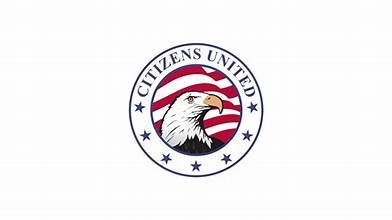
 | Who is/are Citizens United? The name sounds so friendly and democratic. |
According to the Citizens United web site: “Citizens United’s goal is to restore the founding fathers’ vision of a free nation, guided by the honesty, common sense, and good will of its citizens.” David Bossie has been its president since 2000. In 2016 he took a leave of absence to be deputy campaign manager of Donald Trump‘s campaign for President of the United States.
Citizens United’s stated purpose is to return control of the U.S. government over to the “citizens.” This is accomplished using a mix of education and “advocacy”. The goal is to bring back traditional values of limited government, business incentives and minimal regulations, family values and a strong sense of national sovereignty.

January 21, 2010: The Supreme Court ruled (5 -4) in favor of Citizens United versus the Federal Election Commission. This controversial decision reversed century-old campaign finance restrictions and enabled corporations and other outside groups to spend unlimited funds on election “advocacy”.
Justice Kennedy writing for the majority said that limiting “independent political spending” from corporations and other groups violates their First Amendment right to free speech. The majority justices assumed that spending would be transparent, which has proven to not at all to be the case.
This decision has encouraged a huge increase in political spending, dramatically inflating the political influence of wealthy donors and special interest groups. An especially alarming byproduct of the court’s decision has been the creation of murky Super PACs which can spend piles of money from anonymous wealthy donors.
According to a Brennan Center report by Daniel I. Weiner: the Citizens United decision “has helped reinforce the growing sense that our democracy primarily serves the interests of the wealthy few, and that democratic participation for the vast majority of citizens is of relatively little value.”
Super PACS?
Political action committees, or “PACs,” are organizations that raise and spend money for campaigns that support or oppose political candidates, legislation, or ballot initiatives. Traditional PACs are permitted to donate directly to a candidate’s official campaign, but they are also subject to contribution limits, in terms of what they can receive from individuals and what they can give to candidates. PACs can contribute only up to $5,000 per year to a candidate per election.
In the 2010 case Speechnow.org vs Federal Election Commission, however, a federal appeals court ruled — guided by logic from the Citizens United decision — that outside groups could accept unlimited contributions from both individual donors and corporations as long as they don’t give directly to candidates. Labeled “Super PACs,” these outside groups were still permitted to spend money on independently produced ads and other communications that promote or attack specific candidates.
Super PACs do not have spending limits on what they collect or spend. Super PACs are required to disclose their donors, but those donors can include dark money groups, which make the original source of the donations unclear. And while super PACs are technically prohibited from coordinating directly with candidates , weak coordination rules have often proven ineffective.
Super PAC money started influencing elections immediately after Citizens United and has been flowing ever since. Most of that money comes from just a few wealthy individual donors. In the 2018 election, the top 100 donors to super PACs contributed nearly 78 percent of all super PAC spending.
We need to shorten the cycle
and restrict the money flow!


Please explain what you mean about how we should shorten the cycle. I certainly agree we should restrict the obscene money flow.
The longer the election cycle is the more expensive it is. All that “advocacy” costs money.
Let’s do this in 90 days!
Yes. Absolutely. The news is already talking about the next Democratic convention. It makes me sick . I guess they don’t have enough to talk about? Yeah, right!